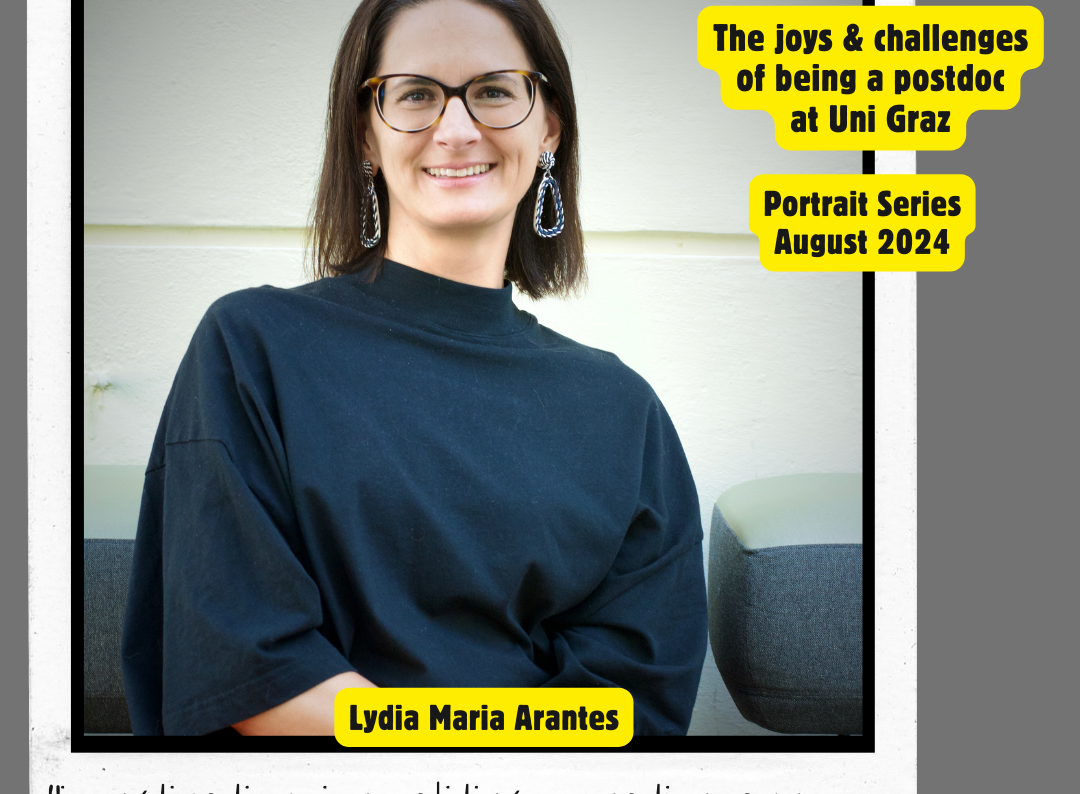This summer, you have the opportunity to get to know some of the brilliant postdoctoral researchers at our university. Our portrait series highlights the diversity within this group of University of Graz research talents - and obviously the fascinating research that they do. Here are four questions for....
Lydia Maria Arantes, Department of Cultural Anthropology and European Ethnology
1) Tell us a little about yourself, and your journey to become a researcher at Uni Graz.
My name is Lydia Maria Arantes and I am a Cultural Anthropologist and musician who has studied in Adelaide, Graz, Würzburg and London. I consider myself an accidental anthropologist but have come to cherish this discipline that in its core interest simply wants to understand and convey how people live their lives, their struggles but also their hopes, their suffering from structural inequality but also their creative agency and vibrancy. In Graz, I appreciate the department’s breadth of expertise and the possibility to pursue the fields of research I am interested in.
2) What are you currently researching, and why do you think it is important (or interesting)?
Recently, I have been investigating the epistemological implications of taking the notion of “embodiment” in academic teaching seriously. What happens if I introduce tools and materials into my anthropological classroom, if students’ bodies gain the same epistemological relevance for learning as do their minds? Stitching away on our embroidery hoops while discussing the prepared readings or field experiments, my students and I learnt that this approach is not only much more fun; it slows down the pace of conversation, allows students with less eloquent cultural capital to find their voice and therefore is more inclusive. Also, students become more proactive – literally taking learning matters into their own hands – and reflective regarding what it means to learn, how to learn (best) and what the role of their bodies in this (ad)venture could be.
3) What gives you joy in your everyday work life & what are some challenges?
At the recent major conference of the Royal Anthropological Institute on “Anthropology and Education” in London, two of my students (early BA- and early MA-level) spoke about their experiences within the above-mentioned context of learning-while-stitching in the panel I co-convened with Michele Feder-Nadoff – thanks to generous funding of the University of Graz. While the hunt for funding was tiresome, I am extremely proud of my students and happy that they took on the challenge to present their paper at an international conference. While teaching can be challenging at times, I do appreciate that I can support young people in finding their way as students but also as human beings. I find the increasing burocratisation annoying but finding creative ways in navigating the system and making it as humane as possible does give me more joy than I might admit.
4) What's next for you this year/next year?
On the one hand, I am developing a tri-national research project in a field that is entirely new for me (immaterial cultural heritage in the cross-border region around Lake Constance), which makes it super exciting. I get to work with new colleagues and also with institutions beyond academia such as museums, which I have wanted to do for a long time. Also, together with Sarah Kühne, the illustrator Anna Stemmer-Dworak as well as the vorarlberg museum, I am working on a graphic novel along the lines of remembrance culture and (transgenerational) war trauma which is based on the autobiography of Delphina Burtscher, my grandmother, whose story has gained interest in the historic disciplines and beyond lately. As a humble daughter-of-alpine-peasants, her late teenage years were marked by the Nazi-regime in horrendous ways as her brother and fiancé (who both deserted) were executed in Graz and she, pregnant, was imprisoned, later on separated from the baby and imprisoned again. The graphic novel offers a reading framed by contemporary circumstances that will make it also accessible to teenagers, young adults and beyond.
Questions: Johanna Stadlbauer, July 2024.
Picture credit: Mauricio Ricardo Arantes
